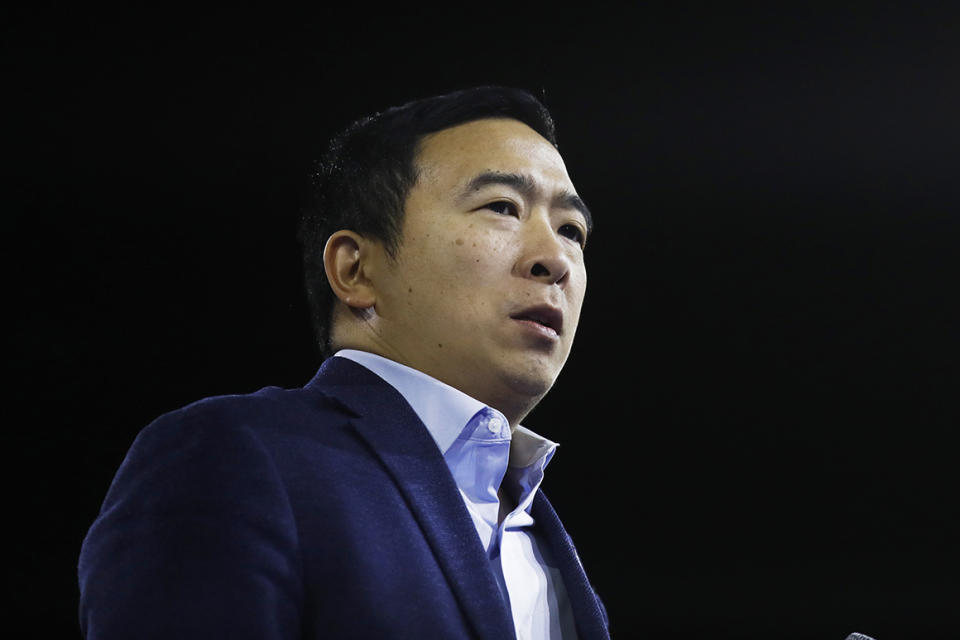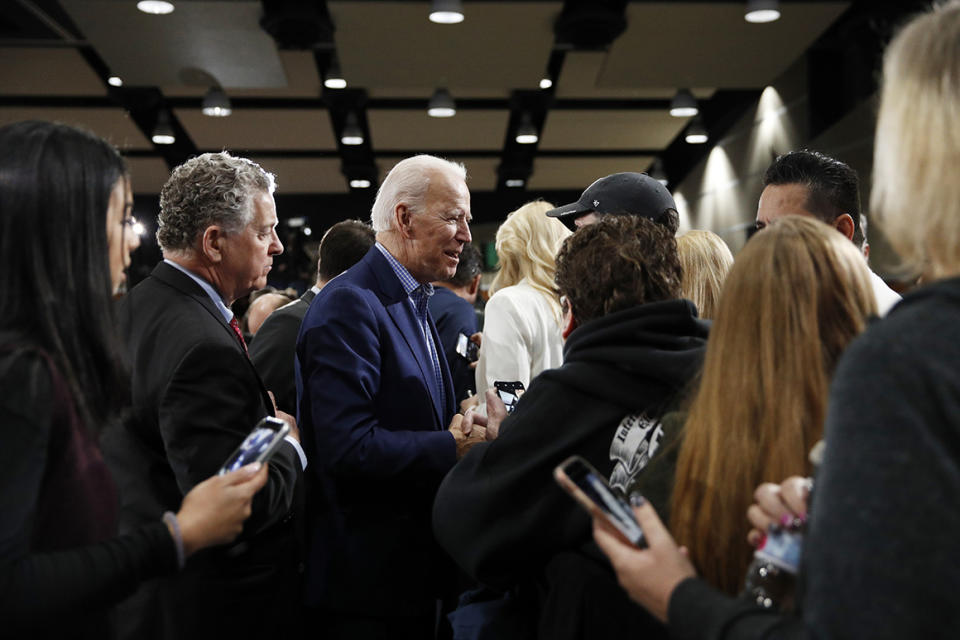’Nearly insurmountable’: Bernie barrels toward Super Tuesday delegate windfall
LAS VEGAS — Bernie Sanders announced to the Democratic establishment earlier this week that it can’t stop his campaign. Many rivals and party insiders now admit he might be right.
Sanders is zooming toward Super Tuesday with victories in Nevada and New Hampshire, a foothold in the delegate-rich states of California and Texas, and a divided, jam-packed field of moderate opponents. All of which puts him on a path to potentially collect enough delegates by the middle of March that no one else can catch up with him, say a growing number of Democratic officials and operatives.
They think the Vermont senator could amass a plurality of delegates by March 17, at which point more than 60 percent of the race's total delegates will have been awarded — thereby making it difficult if not all but unfeasible for his opponents to overtake him.
“It’s entirely possible that Bernie wins South Carolina, particularly because Tom Steyer is drawing a lot of support there. That would give him a head of steam heading into Super Tuesday three days later,” said Andrew Yang, the former Democratic presidential candidate. “He may have a nearly insurmountable lead in the delegate count by mid-March.”

Mark Longabaugh, a senior adviser to Sanders’ 2016 campaign, said changes to the Super Tuesday lineup could also benefit him. North Carolina, one of his strongest Southern states that year, moved their primary to March 3. Maine, another 2016 stronghold, has also switched to a Super Tuesday primary. Most importantly, California is going to the polls on Super Tuesday, too.
"March 3 is not the Southern-dominated March 1 that it was in 2016," said Longabaugh. "People haven't really been paying attention, but this Super Tuesday lines up for Bernie Sanders much, much better than the Super Tuesday we barely survived last time."
Sanders is first in the Golden State, according to the RealClearPolitics polling average, which plays to his advantages: The electorate is liberal and heavily Latino. On Saturday, Sanders won a striking 51 percent of Hispanic caucus-goers in Nevada — 34 points ahead of his closest opponent, according to entrance polls.
“Keep in mind that California has been voting for two weeks. Texas has been voting for five days, and the ballots dropped in Colorado weeks ago,” said Chuck Rocha, Sanders’ senior adviser and architect of his Latino outreach strategy, at a caucus night party in Nevada. “We’ve already been banking all of those votes and all of those Latinos, getting their ballots, calling them, talking to them. That’s going to be a real key to our success.”
Dan Pfeiffer, a former adviser to former President Barack Obama, was asked by Meet the Press host Chuck Todd on Sunday if it is possible to stop Sanders if no candidate drops out before Super Tuesday. “I do not believe it is,” he replied.
Tim Miller, Jeb Bush’s 2016 communications director who was part of a super PAC that year aimed at stopping Donald Trump, wrote on The Bulwark under the sub-headline that reads “history is repeating itself” that “what I didn’t fully realize is that when I joined the PAC, unless something dramatic happened, the race was already functionally over — two days after South Carolina.”
Sanders is suddenly being taken seriously enough that some Democrats think he might be able to pull off an upset — or at least a strong second-place finish — in South Carolina. A CBS News/YouGov poll found Biden with 28 percent and Sanders with 23 percent, and Steyer right behind them at 18 percent. Either scenario would be a remarkable turnaround from 2016, when he lost the state to Hillary Clinton by 47 percentage points.
“Bernie has learned a lot since he got crushed here in 2016,” said Brady Quirk-Garvan, a former Charleston Democratic Party chairman who had backed Cory Booker. “He’s been campaigning forever down here, made early investments, and a crowded field of moderates is his dream scenario.”
Sanders is stumping this week in North and South Carolina, including near the border, where, Quirk-Govan said, he can simultaneously “campaign in a Super Tuesday state but try to eat into Biden’s lead in South Carolina.”
But as he gains momentum, Sanders looks to be entering a more challenging moment. At the final debate before Nevada’s caucuses, most of his rivals chose to train their fire not on the frontrunner, but on Bloomberg — just one example this cycle of Sanders benefiting from his opponents seemingly underestimating him.
After Sanders' decisive victory in Nevada, however, Pete Buttigieg used his caucus night speech to accuse Sanders of believing in “an inflexible, ideological revolution that leaves out most Democrats, not to mention most Americans.”
Joe Biden took a similar shot Saturday, saying, "I ain’t a socialist. I ain’t a plutocrat,” referring to Sanders and Bloomberg. And Elizabeth Warren has stepped up criticisms of Sanders in recent days, saying, “I don’t want to be president just to yell at people.”

Sanders’ team expects an onslaught of attacks at Tuesday’s debate. And Bloomberg’s campaign has not ruled out millions in negative ads — and with an unlimited budget, it’s difficult to predict the result of such an effort.
Still, there are no signs yet that any of Sanders’ top opponents are dropping out. Buttigieg’s campaign argued in a memo that he is the one to challenge him head-to-head, despite his difficulty appealing to voters of color, saying that “if the dynamics of the race did not dramatically change, Democrats could end up coming out of Super Tuesday with Bernie Sanders holding a seemingly insurmountable delegate lead.”
Likewise, Bloomberg’s aides wrote in a memo that "I don’t think many people understand the dire circumstances here” and suggested other candidates should drop out — seen as an affront by those who have already participated in primaries and amassed delegates.
Even if the field winnowed, it’s possible a one-on-one race would not deliver the results Sanders’ many moderate opponents hope. But a February Yahoo/YouGov poll showed him defeating Bloomberg and Buttigieg by double digits if they faced off against him one-on-one. Biden and Warren were the most competitive in a hypothetical match-up, though Sanders was still ahead of them by four and two points, respectively.

